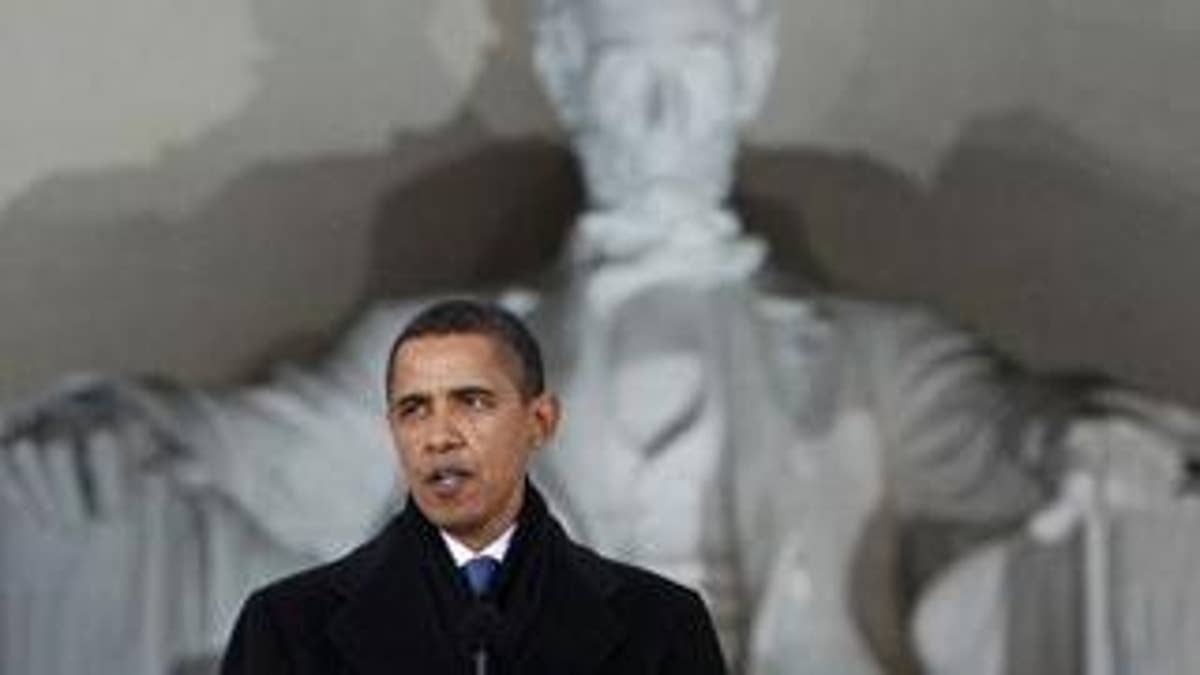
In almost every major address he has ever given, President Obama has invoked the name of the first man from Illinois who moved into the White House. Now, a century and a half later, as he battles a towering economic crisis that could be the greatest test of his presidency, Obama may well be asking himself:
What would Lincoln do?
America was on the brink of catastrophe in 1861, when Abraham Lincoln took the oath of office. It fell upon the 16th president to convince Congress that winning a Civil War against the secessionists from the South would preserve the United States.
A monumental crisis now faces Obama, who has stepped into office amid the worst financial collapse since the Great Depression. The 44th president now is trying to persuade Congress that it needs to invest trillions of dollars to save the nation's economy.
Obama's situation is different from Lincoln's, as is the political environment. But historians say their responses to their crises bear striking parallels.
"Both Lincoln and Obama advocated big government and actively believed it could do good," said Timothy Roberts, professor of American history at Western Illinois University in Moline, Ill.
"The size and complexity of the situation facing Obama would have baffled Lincoln, but he would have embraced Obama's attempt to balance tax cuts -- intended to encourage individual initiative and entrepreneurship -- and government spending," Roberts said.
Lincoln -- a member of the Whig Party who was alive during major economic collapses in 1837 and 1857 -- believed government should intervene when the markets failed.
"The Whig Party -- which later became the Republican Party -- was very much interested in the government having input into the economy," said Alan Kraut, professor of American history at American University in Washington, D.C.
"Lincoln expanded the government's role enormously during his presidency," Kraut said.
Lincoln favored a more active government during financial difficulty. And his party favored publicly financed internal improvements -- especially for building the nation's transportation system through canals and railroads. And the first income tax was passed during the Civil War.
"I am in favor of a national bank ... in favor of the internal improvements system and a high protective tariff," Lincoln said in 1832. "[Free trade is a system whereby] some have labored, and others have, without labor, enjoyed a large portion of the fruits.... To secure to each laborer the whole product of his labor, or as nearly as possible, is a most worthy object of any good government."
Could Obama have taken note? The president's stimulus proposal to fix the economy calls for massive government spending.
The president's "spendulus" proposal -- which passed in the Senate on Tuesday -- allocates $200 million for a "virtual fence" along the Southwestern border and hundreds of millions of dollars for a satellite system to monitor climate change. Provisions in the House version of the bill call for billions of dollars to subsidize Amtrak, $20 billion to expand the food stamp program and $2 billion toward subsidizing childcare.
"Only government can break the vicious cycles that are crippling the economy -- where a lack of spending leads to lost jobs, which leads to even less spending," Obama said during an economic address last January.
Historians say Lincoln, who championed equal pay and the common man's rise to success, likely would have approved of Obama's decision to cap executive pay -- though they acknowledge that such exorbitant CEO compensation would have been foreign to Lincoln.
"I don't believe in a law to prevent a man from getting rich; it would do more harm than good. [But] while we do not propose any war upon capital, we do wish to allow the humblest man an equal chance to get rich with everybody else," Lincoln said in 1860.
Historians also say that Obama and Lincoln faced similar criticism for some of their economic policies.
"Critics of Obama, like critics of Lincoln, claim these policies smack of European style socialism," Roberts said.
Despite their similarities, historians note key differences between the 16th and 44th presidents and the political context in which they governed.
"Lincoln came into his crises very well-prepared. He had spent six years contending with Stephen Douglas about the expansion of slavery into the territories -- which was the major issue at the time. Obama hadn't been challenged in the same way prior to his election," said American historian Richard Brookhiser.
Unlike Lincoln, Obama has enjoyed widespread support both domestically and abroad in his early days in office.
"Lincoln was elected by the smallest percentage support of any U.S. president. And at the beginning he was criticized and lampooned unmercifully by foreigners who assumed he was a buffoon," Roberts said.
And both Lincoln and Obama -- though advocates of bigger government -- differed in their approach to achieving it.
"While Lincoln was willing to take a lot of this bold action himself, Obama is trying very hard to work in a spirit of [bipartisanship] and to work cooperatively with the Congress," said Kraut.




